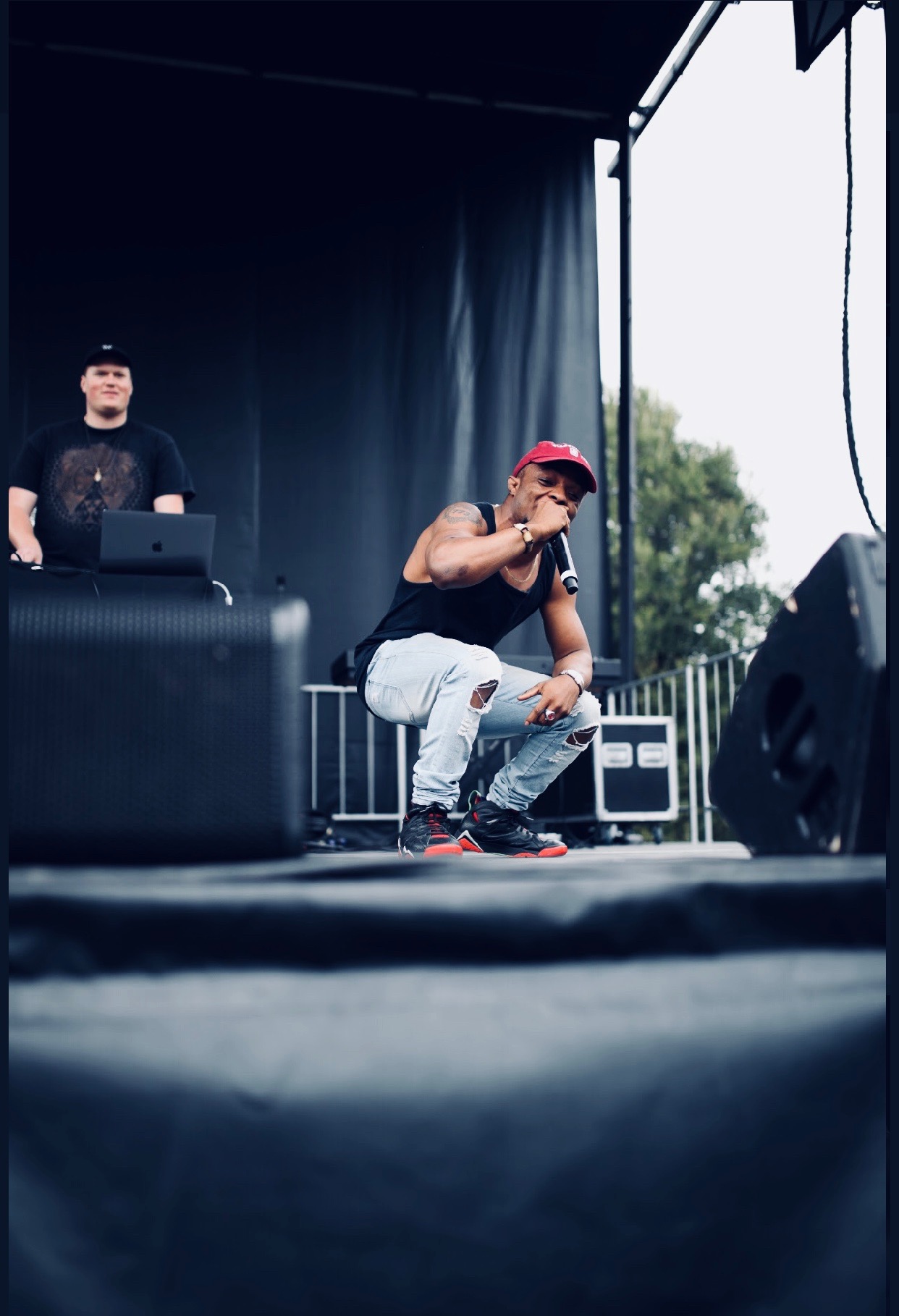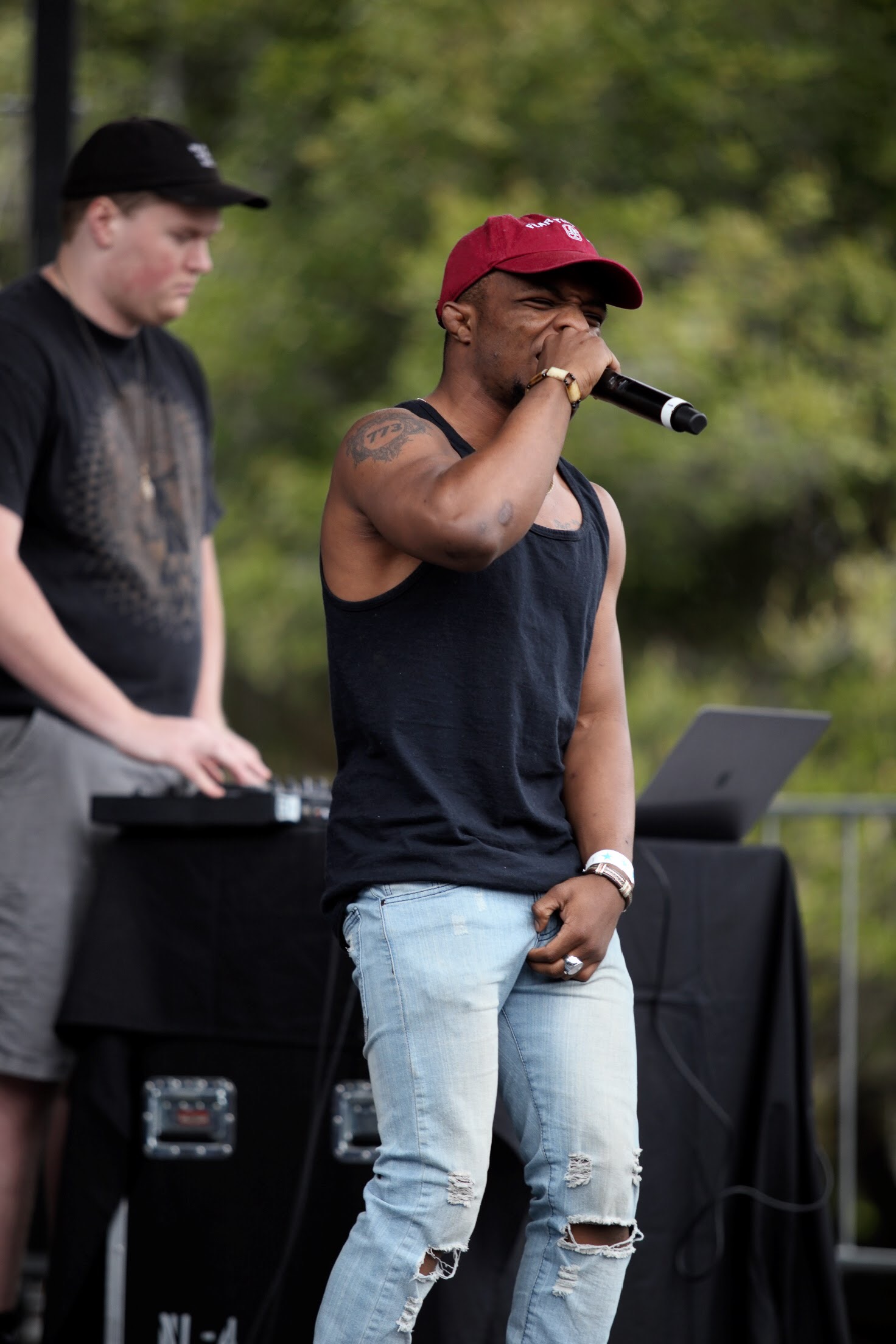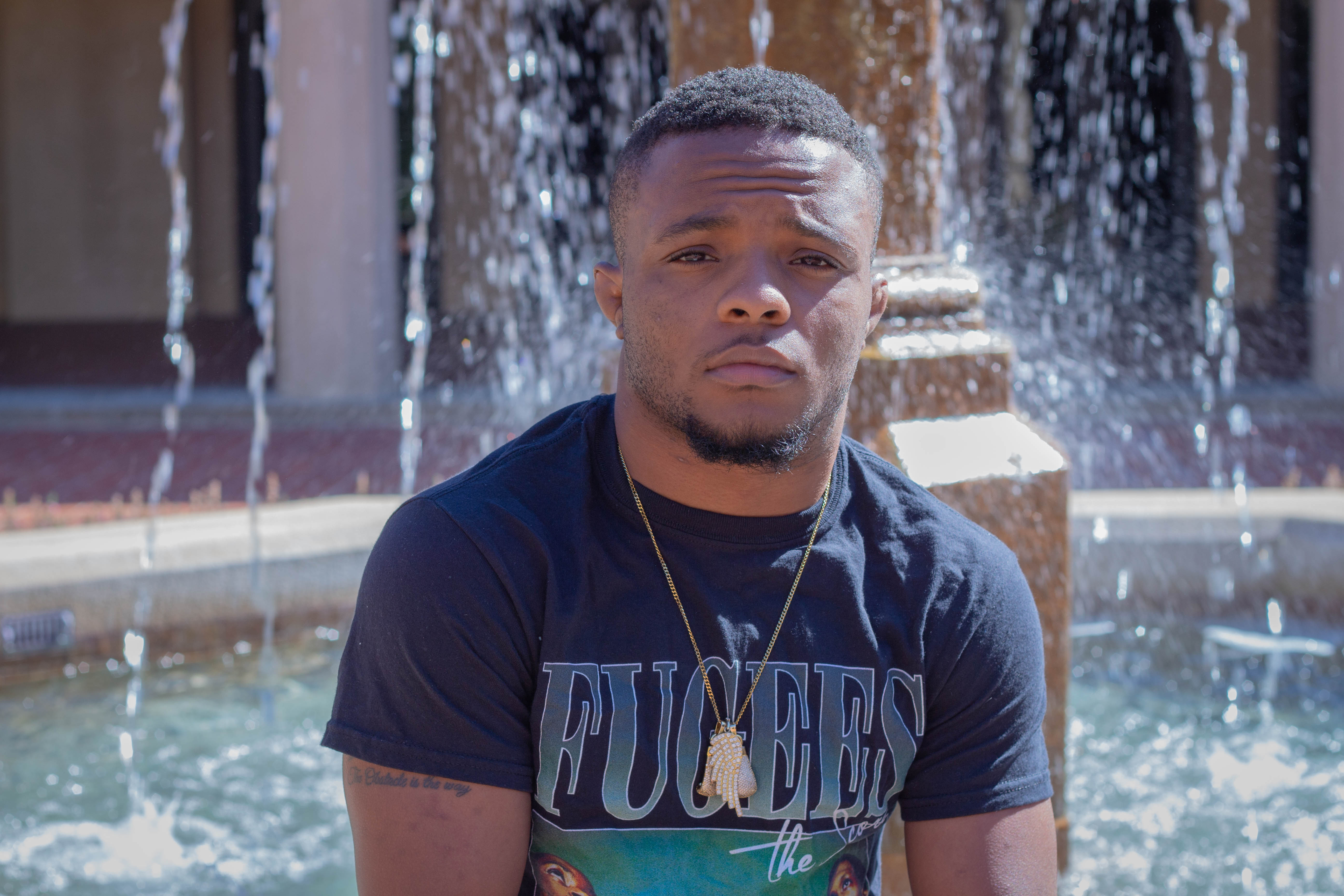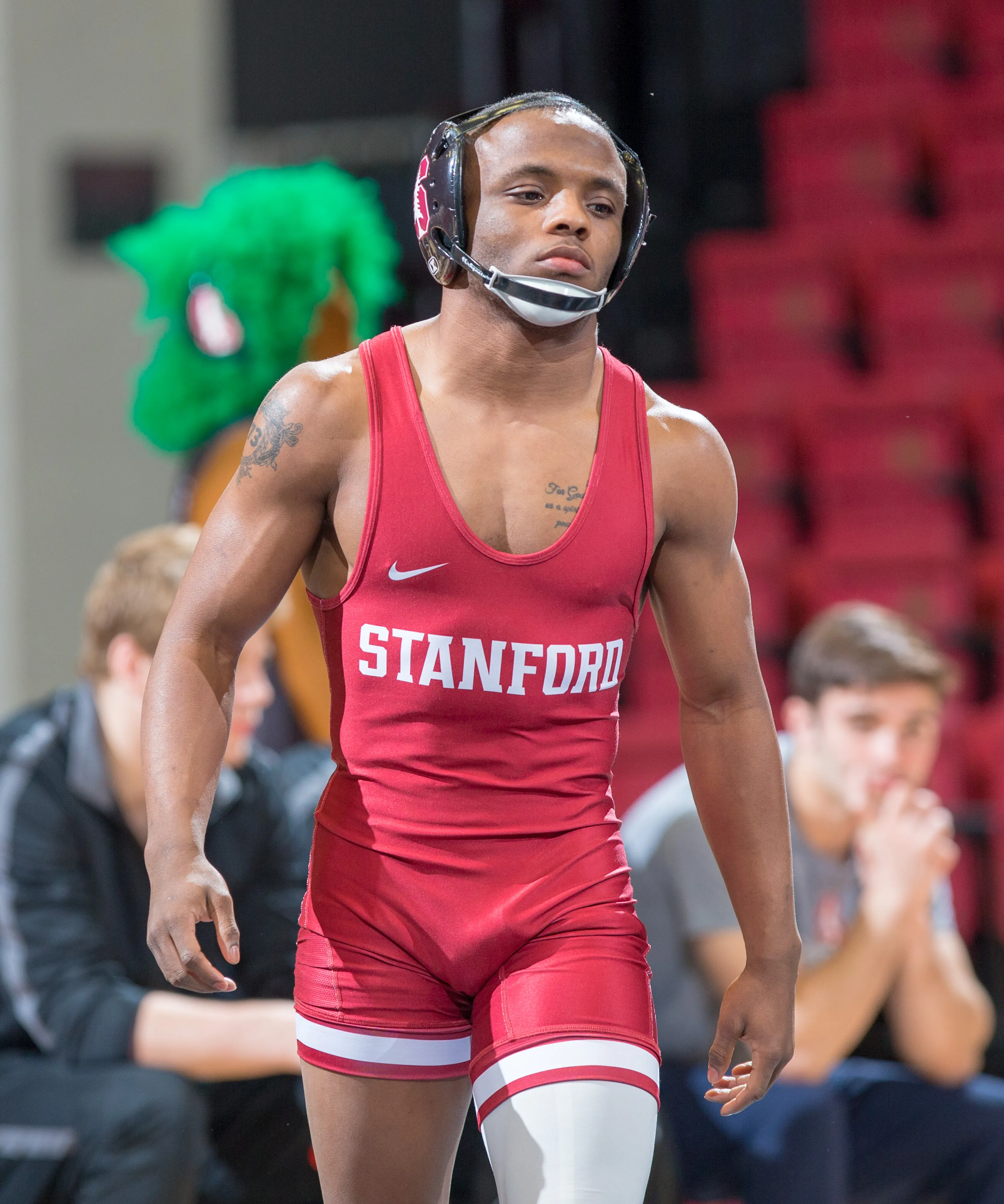When Gabriel Townsell ’20 arrived at The Stanford Daily building, he was wearing Mac Miller’s face on his shirt. For the 21-year-old, Stanford-via-West-Side-Chicago rapper, wrestler and political science student, Mac’s music has always been a guiding light for his own. And in listening to Townsell, who raps and produces under the name VII (pronounced “seven”), it’s easy to see how he was influenced by the late Pittsburgh rapper.
The similarity is not just in the sound itself. Though VII’s third album Marketable Melancholy, which came out in June, handles as eclectic a span of styles as Mac’s 2018 release, Swimming, the true point of comparison between the two, is in the joy in their music. It’s their joy for music as well as a childlike creativity and enthusiasm for artistic experimentation that shines through, no matter what emotions they’re rapping about.
Over the past few years, VII has built an impressive resume both at Stanford and his native Chicago — one that speaks to an artistic spirit and skill beyond his years, fueled by a dedication to his craft and a relentless pursuit of new creative avenues. You may have seen him performing at Blackfest in 2018, where he opened for 2 Chainz; he competed in the Stanford Concert Network’s Battle of the Bands in January of this year and he was featured at Kairos’ Wine and Cheese night in November. Maybe you’ve heard the two mixtapes he dropped on SoundCloud this summer in addition to Marketable Melancholy.
But even if you haven’t heard of VII yet, he’s making one hell of a case for himself this year, bringing a blend of hard-edged, lyrical rap, amped-up trap-influenced flows and surprisingly tender rhythm and blues hooks and production. This all establishes him as a sort of rap game polymath, able to deliver consistently over a full album but also wow you in each individual, devastating track.

Streams of Consciousness
In fact, a single, powerful track is how VII got his breakthrough making music in the first place. But even before he released his debut single in the summer of 2016, which has racked up around 100 thousand plays on SoundCloud since its release, Townsell was ready to rap.
Townsell had always had a connection to music, with everything from rap to gospel to Cuban jazz drifting between the walls of the Chicago home where he grew up. And from a young age, Townsell has had synesthesia: a perceptual condition where you see music as colors. That musical environment led to a few early attempts at writing rap lyrics. Townsell says that by the time he was 10 or 11, he was writing verses that were “structurally sound.” But his route to making music was a circuitous one.
When Townsell started high school, his main focus wasn’t music but instead wrestling, the sport in which he still competes as part of Stanford’s NCAA team. His gateway into the world of professional rap was actually his school’s slam poetry team. Though he casually participated in school-wide poetry slams in his first few years of high school — even winning one in his sophomore year — it took a very direct intervention to get him seriously onto the path that would lead him to the rap game. As he arrived at weight training for wrestling one day, Townsell found himself almost ambushed by the spoken word team’s coach, who had shown up early to his practice to recruit him personally. That dedication was enough to convince Townsell to join. In his own words, “If you put in that much effort, I might as well.”
That appreciation for effort is key to understanding Townsell’s strengths in everything that he does. He doesn’t think he’s put out a bad verse yet — bad songs, sure (he recounts a particularly uninspired, sitar-heavy beat that he once did a feature on with a grimace) — but it’s never for lack of trying on his part. Yet such a claim doesn’t feel arrogant coming from him; it literally sounds earned — the product of a thorough education in the art of rap.
VII’s education didn’t just come from listening to rap — though he can certainly rattle off a list of his influences, from established legends like André 3000 and Lil Wayne to local heroes like Lupe Fiasco, Saba and Noname. It instead came from actually putting in the work, from joining his high school slam poetry team’s “Hip-Hop Wing” and meticulously developing his own cadences from a rap-oriented style into true flows. He made the switch because of how natural the fit was — he says that Adam Levin, who would be his mentor there, told him that “he was already rapping anyways.”
In Hip-Hop Wing, Townsell spent hours upon hours freestyling and writing under the tutelage of Levin (who raps under the name DefCee), who Townsell describes as “one of the best underground rappers in the city of Chicago.” With Levin, Townsell refined his writing skills and excelled by all measures. He would deliver 32 bars of rap when an exercise called for 16 — an example of his talent for writing “unnecessarily fast,” as he puts it.
Levin was the first person who seriously encouraged VII to actually get in the booth and record his music after seeing his promise in 2015-or-so. A few features followed — verses that showcase a young performer still developing his confidence in his own lyrics. But it took the protests in the summer of 2016 over the police killings of Alton Sterling in Baton Rouge and Philando Castile in Minnesota to get VII to release his first solo record: “Stream of Consciousness.”
“Stream of Consciousness” is a three minute showcase for VII, a simple beat — just a piano melody and some hard drums for most of its runtime — that he sprawls hard-hitting lyrics over. He made the song in the heat of a passionate, righteous rage, inspired by seeing “Black women in a situation of strength, juxtaposed with people who have on armor, riot shields.” The track’s title reflects his state of mind — he estimates he wrote it in “five, seven minutes.”

Yet he’s poised throughout, stringing together bars that link his personal ambitions and the threat of racist violence with a sophisticated precision that belies his youth: “I love America but feel the need to question cops / I wonder if they gave me 16 shots, would my 16s live / when my limp knees dropped?” But “Stream of Consciousness” finds its peak when VII chooses to let other voices do the talking. When the song’s outro begins, he lets the voices of the police protests that inspired his music speak: “I have lost three brothers to this, sir. This is not alright! I’m hurting. You see my eyes? My people out, here hurting!”
The creative process underlying “Stream of Consciousness” and its ensuing success ultimately inspired Townsell to take rapping seriously. In the two years following the track’s release, he’s delivered on its promise, releasing hours upon hours of music on SoundCloud and Spotify. He’s developed his technical skills as well, improving as not only a rapper but also an engineer and a producer. While he doesn’t produce all of his tracks alone — he credits a network of producers, including Noah Anderson ’20, for many of his beats — he always makes sure to tweak his songs and bring out the parts of them that correspond best to the verses he’s written: another sign of his critical consciousness about his music.
An eclectic formula
Part of what made me interested in talking with Townsell in the first place was the divide between Gabriel Townsell — the Pac-12, All-Academic Second Team wrestler — and VII the rapper. But when I ask how he balances the demands of the notoriously, memetically strenuous life of a student-athlete with his rapid rate of music production, Townsell cuts me off.
“It doesn’t take that much effort,” he says breezily.
He doesn’t see rap as an obligation in the same way school or athletics is. Instead, he sees it like how many of us would see playing video games or pleasure reading.
“If I want to relax, I can write,” he explains simply.

And it’s that attitude that allowed VII to amass an impressive catalog of songs in remarkable time. It took him just above two years to release everything from “Stream of Consciousness” to his most recent single, “FALL $LOW.” In total, that’s more than four hours of music across more than 70 songs on a half-dozen projects. Just this summer, he’s released three full projects: the two “CHiCO DeBARS” mixtapes plus Marketable Melancholy.
That project stands as not only VII’s most impressive work but also as a legitimately impressive artistic statement in the world of rap today: a rap album above 12 songs whose length feels earned rather than tacked on. That was intentional, as he recalls.
“I couldn’t afford to make a 25 song project — I’m not Lil Wayne,” he said.
He instead had to make hard choices in narrowing down the track listing for MM — each one of the album’s 17 tracks has a purpose, both on their own and in the context of the record’s broader concept. He makes clear to me that he wanted to make a project that wasn’t just a collection of songs.
“The concept came first,” he said with a certain finality to it.
VII only had the luxury of cutting songs from Marketable Melancholy because of the sheer volume of music he produces, day-in and day-out. He’s almost industrial in his production levels at this point. He says he has the problem of “too many beats,” with 60 or so on his phone alone, which allows him to be selective in the ones he spits over. Even so, he spends a couple hours each day rapping and recording after practice. His process usually starts from the beat, rapping and feeling his verses out until he has a solid lyrical foundation. After recording the tracks themselves, he plays around with plugins and mixes the tracks at least four times, taking hours just to perfect the sound of a given song. It’s a dedication that pays off. Despite his limited resources, VII’s tracks sound as polished as any major label release.
Despite his work ethic and dedication to his craft, VII isn’t a self-serious rapper in the backpacker mold. He’s quick to a joke or drop a hot take as we talk, opining on everything from A$AP Rocky’s disappointing year (“He’s the Carmelo Anthony of rap”) to Drake’s feud with Pusha T (On Drake’s “Duppy Freestyle:” “If you sound disappointed, you can just lie [and get away with it]”) to certain controversial musicians from his hometown of Chicago (no guesses as to who, but you’ve probably heard a lot about his misdeeds from certain documentaries that came out over winter break).
But the topic that VII has the most takes on is himself. He’s an artist at a crossroads, sure enough in his abilities to sample beats from rappers as established and diverse as Lil Wayne and Lil Pump and uniquely incorporate them in his mixtapes; yet, he’s young enough to continue experimenting and tweaking his sound. After improving his singing and R&B production on Marketable Melancholy’s first half, he’s interested in bringing more influences from rock and punk into his music. He shouts out the late Lil Peep, who bridged the divide between third-wave emo and SoundCloud rap for making “inspiring” music that didn’t force the connection to rock but instead came to it naturally as well as Linkin Park’s Chester Bennington, whom he has listened to since childhood.
To VII, it’s not enough to just look like a rock star: “Any rapper can do that if they just want to be edgy for some reason.” As with all things, Townsell’s dedication to sonic experimentation is all about putting the effort in.
As for his own future, Townsell has a lot to look forward to. While he plans to slow his VII releases as the wrestling season ramps up through the winter (he dropped “FALL $LOW” — a single — on New Year’s Day to tide people over), he’s got big plans come spring: a three-part project, seven songs each, simply entitled VII as a shout out to the 773 area code of his hometown in Chicago. He thinks it will be his most cohesive and polished project yet. Half or more of the songs are already near-finished, giving him ample time to perfect them before release.
After VII drops, the future is wide open for Townsell. He plans to keep rapping for years to come, through Olympic training cycles and a few years wrestling post-college — and maybe even into his plans for law school. Despite all these non-musical ambitions, he’s not entirely opposed to the idea of eventually pursuing a full-time, professional rap career. He notes, with a laugh, that he’s already come further in rap than he ever thought he would. And with his potential and dedication, there’s no doubt Townsell will end up successful — whether in rap, wrestling or whatever he puts his mind to.
He’s sure of himself, with a confidence that’s contagious: “There’s no version of me that isn’t doing what I’m doing now.”
Contact Jacob Kuppermann at jkupperm ‘at’ stanford.edu.
